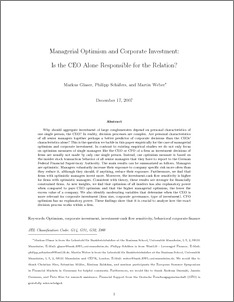|
Managerial Optimism and Corporate Investment : Is the CEO Alone Responsible for the Relation?
Glaser, Markus
;
Schäfers, Philipp
;
Weber, Martin
![[img]](https://madoc.bib.uni-mannheim.de/style/images/fileicons/application_pdf.png)  Vorschau |
|
PDF
SSRN_ID1074342_code327099.pdf
- Veröffentlichte Version
Download (345kB)
|
|
URL:
|
https://ub-madoc.bib.uni-mannheim.de/1802
|
|
Weitere URL:
|
http://papers.ssrn.com/sol3/papers.cfm?abstract_id...
|
|
URN:
|
urn:nbn:de:bsz:180-madoc-18021
|
|
Dokumenttyp:
|
Arbeitspapier
|
|
Erscheinungsjahr:
|
2007
|
|
Titel einer Zeitschrift oder einer Reihe:
|
Working papers / Lehrstuhl für ABWL, Finanzwirtschaft, insb. Bankbetriebslehre
|
|
Band/Volume:
|
153
|
|
Ort der Veröffentlichung:
|
Mannheim
|
|
Sprache der Veröffentlichung:
|
Englisch
|
|
Einrichtung:
|
Fakultät für Betriebswirtschaftslehre > ABWL u. Finanzwirtschaft, insbes. Bankbetriebslehre (Weber 1993-2017)
|
|
MADOC-Schriftenreihe:
|
Lehrstuhl für ABWL, Finanzwirtschaft, insb. Bankbetriebslehre (Weber) > Working Papers
|
|
Fachgebiet:
|
330 Wirtschaft
|
|
Fachklassifikation:
|
JEL:
D80 G32 G31 G14 ,
|
|
Normierte Schlagwörter (SWD):
|
Kapitalanlage , Konzern , Optimismus , Cashflow , Finanzierung
|
|
Freie Schlagwörter (Englisch):
|
Optimism , corporate investment , investment-cash flow sensitivity , behavioral corporate finance
|
|
Abstract:
|
Why should aggregate investment of large conglomerates depend on personal characteristics of one single person, the CEO? In reality, decision processes are complex. Are personal characteristics of all senior managers together perhaps a better predictor of corporate decisions than the CEOs' characteristics alone? This is the question we tackle in this paper empirically for the case of managerial optimism and corporate investment. In contrast to existing empirical studies we do not only focus on optimism measures of single managers like the CEO or CFO of a firm as investment decisions of firms are usually not made by only one single person. Instead, our optimism measure is based on the insider stock transaction behavior of all senior managers that they have to report to the German Federal Financial Supervisory Authority. The main results can be summarized as follows. Managers are optimistic. Managers voluntarily increase their exposure to company specific risk more often than they reduce it, although they should, if anything, reduce their exposure. Furthermore, we find that firms with optimistic managers invest more. Moreover, the investment-cash flow sensitivity is higher for firms with optimistic managers. Consistent with theory, these results are stronger for financially constrained firms. As new insights, we find that optimism of all insiders has also explanatory power when compared to pure CEO optimism and that the higher managerial optimism, the lower the excess value of a company. We also identify moderating variables that determine when the CEO is more relevant for corporate investment (firm size, corporate governance, type of investment). CFO optimism has no explanatory power. These findings show that it is crucial to analyze how the exact decision process works within a firm.
|
|
Zusätzliche Informationen:
|
Also available at SSRN [s. "Weitere URL"]
|
 | Dieser Eintrag ist Teil der Universitätsbibliographie. |
 | Das Dokument wird vom Publikationsserver der Universitätsbibliothek Mannheim bereitgestellt. |
 Suche Autoren in Suche Autoren in
Sie haben einen Fehler gefunden? Teilen Sie uns Ihren Korrekturwunsch bitte hier mit: E-Mail
Actions (login required)
 |
Eintrag anzeigen |
|
 ORCID: 0000-0001-5018-3317
ORCID: 0000-0001-5018-3317



 Suche Autoren in
Suche Autoren in